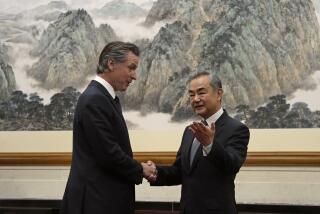Mutual Understanding
Far from the Klieg lights and choreography of President Clinton’s state visit to China, a small Chinese tour group waded through the offices of Liberty Mutual Insurance Co. in Glendale on Monday.
In their shirt sleeves and with notebooks at the ready, the dozen district-level government officials and nascent insurance industry representatives spent two hours in Glendale, learning about the insurance business from the bottom up.
They scribbled away as Alfred Bergbauer, Mutual’s vice president for Chinese development, talked about no-fault insurance, adjustable rates and profits. Bergbauer ended with a thinly veiled plea: “Hopefully, we’ll receive an insurance-operating license in China soon.”
The visitors were full of questions about the workings of a free market.
“Do you get any funding from the government?” asked Hui Chuan Sun, district manager of the Yanliang District Government. “And if you lose money, does the government help?”
The free market is free both ways, the reply came: A company can gain money or lose it, with the government only regulating the marketplace, not controlling it. In short, going into business is a risk and the so-called “iron rice bowl” policy of China, which once guaranteed care to everyone from cradle to grave, is now being shunted in favor of a more market-oriented approach, Bergbauer said.
*
In a centralized economy like China’s, the government’s concern includes virtually anything, said Albert Lai, whose Monterey Park-based ASM/China Group arranged the Liberty Mutual visit. “But that’s already changing,” he said.
“At one time, Chinese people were concerned primarily with getting food for their family and so on. Today, they want what Americans want, to make money and do business.”
To make money like Americans, he said, means learning the Americans’ way of doing business. That’s why this tour group not only visited Glendale, but also Silicon Valley, to learn about technology districts and development, he said.
For 10 years his company has been arranging such trips, offering roughly 7,000 Chinese entrepreneurs and government officials a peek at American business from the inside. The Chinese visitors have toured online service providers, industrial sites and even Caltrans’ Los Angeles-area transportation management control center.
*
When Lai began his venture, he was one of a handful of such companies around the country. The Commerce Department now estimates that hundreds of such companies exist.
“By bringing people together from both sides, that’s the only way to help foster real relationships,” Lai said. “Clinton’s visit is important, but this way more people understand each other at a basic level. It’s about time for the two countries to move closer.”
Since 1990, the year after the massacre at Tiananmen Square, direct U.S. business investments in China have grown from $30 million to $1.2 billion in 1997, according to the Commerce Department.
“China has emerged as our most rapidly growing large export partner,” said Nick Lardy, a senior fellow and China expert at the Brookings Institution in Washington. “This development, this growth in economic ties couldn’t happen in a vacuum. The political context is very important. But the changing economic relationship is creating changes on its own China.”
Mainland China, according to Brookings analysis, represents the U.S.’s ninth-largest trading partner. But with nearly 18% average annual growth in the Chinese market, China is the fastest-growing market for U.S. exports.
Liberty Mutual officials said they didn’t know if Monday’s meeting would improve their position in China, but held out the hope that it was a start and certainly better than no engagement at all.
*
“We don’t have a license to do insurance work there now,” said one Mutual officer who attended the meeting. “But maybe soon we will and we can make money there, with our Chinese friends.”
More to Read
Inside the business of entertainment
The Wide Shot brings you news, analysis and insights on everything from streaming wars to production — and what it all means for the future.
You may occasionally receive promotional content from the Los Angeles Times.









